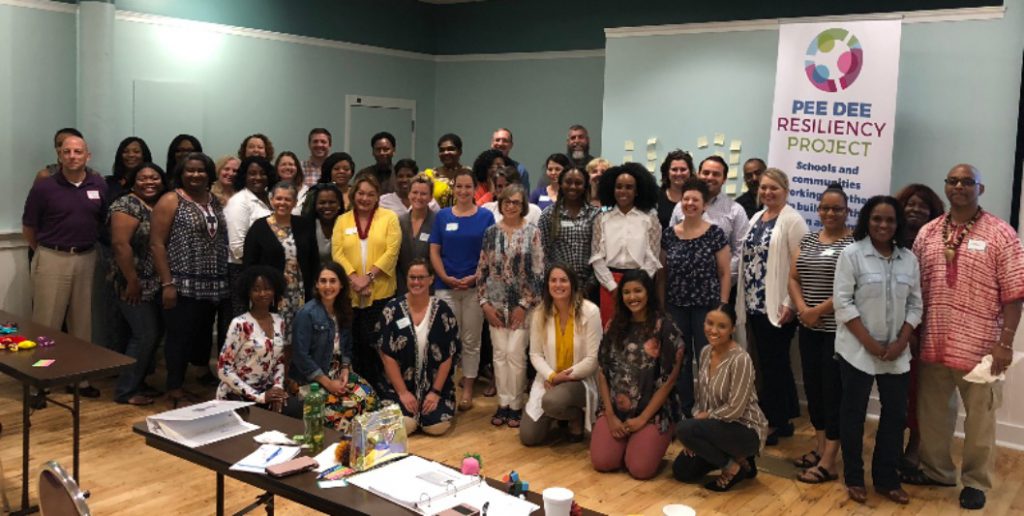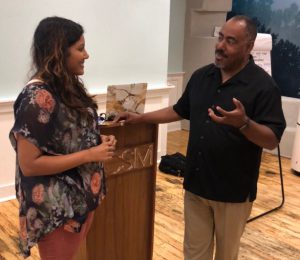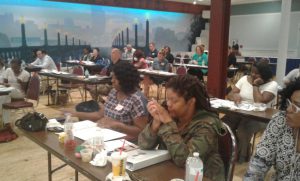As Children’s Trust works to prevent adverse childhood experiences in South Carolina, the organization held a recent training session for ACE trainers and school mental health clinicians. Neil White, who tells our prevention stories, covered the event.

Rick Griffin believes strongly in the importance of building resilience into the fabric of communities across the nation.
An educator from Washington state, Griffin led a three-day training hosted by Children’s Trust at the S.C. State Museum that provided 50 child-serving professionals with crucial strategies that can build resilience and help prevent trauma in their communities.
Griffin delivered the ROLES curriculum – an acronym that stands for recognize, observe, label, elect and solve, the actions needed to build individual competency and resilience – developed by the Children’s Resilience Initiative in Walla Walla, Washington. He’s the executive director of the Jubilee Leadership Academy, a trauma-informed boarding school that works with struggling teens.
“Find out what’s wrong,” Griffin told the attendees. “Understand the underlying problems in order to determine how to help.”
Children’s Trust is seeking to prevent adverse childhood experiences (ACEs) in South Carolina by bringing together a network of people committed to improving health and well-being in every community through its statewide ACE Initiative.
Research shows that children who are exposed to trauma like physical and emotional abuse, divorce, substance use/misuse, domestic violence and mental illness are much more likely to become adults with problems like depression, alcoholism, obesity, heart and liver disease, and decreased workplace performance. By addressing the issues of childhood abuse and family dysfunction on the front end, a multitude of health and social problems later in life can be prevented.
This initiative, funded by the BlueCross® BlueShield® of South Carolina Foundation, an independent licensee of the Blue Cross and Blue Shield Association, involves sending trainers to different groups to talk about ACEs and explain how Children’s Trust is collecting and disseminating data, building a prevention planning framework, and promoting sound legislative policy to address ACEs in our communities. This group of 75 master trainers includes nonprofit professionals, social workers, health care and medical providers, teachers, school administrators, parents, faith-based organization members, and policy makers.
As part of its work to combat the effects of ACEs in a specific way, Children’s Trust is currently teaming with the S.C Department of Mental Health, University of South Carolina School Behavioral Health Team, and Pee Dee Mental Health Center on a three-year project. The Pee Dee Resiliency Project (PDRP) is a community-based partnership connecting school mental health clinicians and counselors with students and their families at eight elementary schools in Florence, Darlington and Marion counties in order to help address emotional and behavioral challenges resulting from ACEs that interfere with student success.

Aditi Srivastav Bussells and Rick Griffin discuss the importance of building resilience during a break in the sessions.
“The goal of hosting the ROLES training was to provide our ACE trainers and mental health clinicians the opportunity to learn the appropriate techniques to build resilience among individuals experiencing trauma,” said Aditi Srivastav Bussells, Children’s Trust research and community impact manager. “The ACE Interface curriculum does an excellent job of teaching us why ACEs are important and the need to prevent their long-term impact. This training was a natural next step as to how we prevent the long-term impact of ACEs. Our hope is that clinicians will infuse the approaches learned in their practice, and ACE trainers will incorporate trauma-informed facilitation in their ACE presentations and provide ROLES training.”
The participants found the three days of training especially enlightening as it related to their various work roles. Allison Farrell, the school-based mental health program manager for S.C. DMH, called it “probably the most applicable training I’ve had. I can take it and use the information today, both personally and professionally.”
Brittany Boatwright, a school-based counselor in Darlington County for Pee Dee Mental Health, received the types of insights that allow her to think more creatively while looking at the bigger picture of the child’s life away from school. Instead of schools issuing policy-mandated suspensions for misbehavior, she is working to determine what underlying causes may be causing classroom disruptions.
“We have different things that we’re going through, and it affects us all,” Boatwright said. “I have a special role through PDRP. I normally wouldn’t be in all of those aspects of life, but PDRP is training us to become more aware of how these things affect the child.”
Bussells points to the expertise of the Community Resilience Initiative in helping state organizations take the next steps in enacting resilience strategies that can counter ACEs. Washington state – where the acclaimed documentary “Paper Tigers” was filmed at an alternative high school that radically changed its approach to disciplining students caught in cycles of poverty and violence – has served as a model for states like South Carolina, which is working to support community-based prevention of ACEs.
Griffin is impressed by South Carolina’s commitment to taking on the challenge of sharing these insights in such a structured fashion.
“In terms of nationwide, you are probably ahead of the game a little bit. South Carolina is a step above with folks understanding the knowledge,” Griffin said.

The 50 professionals in attendance at the training soaked up the information to take back to their communities.
Bryan Hoover, an independent training contractor working in suicide prevention, attended the event to better understand how resilience strategies can slow the rate of youth suicides in South Carolina. An ACE master trainer, Hoover realizes childhood adversity harms developing young brains. Repeated toxic stress in the early years of development affect children in ways that last their entire lives as those experiences get wired into individual biology.
Hoover wants to learn how individuals, child-serving professionals and communities can raise the level of hope up to the level of resiliency.
“We know folks that have suicide ideation, or actually (commit) suicide, there’s no hope,” Hoover said. “We can figure out what’s going on in the brain, and put maybe a label to it, to help identify there’s a reason why they’re feeling this way. Something’s going on. But the resiliency piece is going to be a very important piece to the puzzle. This is very important to fill in the spaces of what we can do in the suicide prevention and intervention field.”
Griffin talked in detail about NEAR science – the fields of study comprised of neuroscience, epigenetics, ACEs and resilience. As states begin to embrace this knowledge, the long-term ramifications can be significant in improving health and social outcomes into adulthood.
“If we really look at every individual throughout our communities, understanding resilience, the health demographics increase,” Griffin said. “We know now that the No. 1 public health concern of our time is related to adverse childhood experiences. Resilience can really help people stay healthier and happier, and well-being increases throughout our country.”




